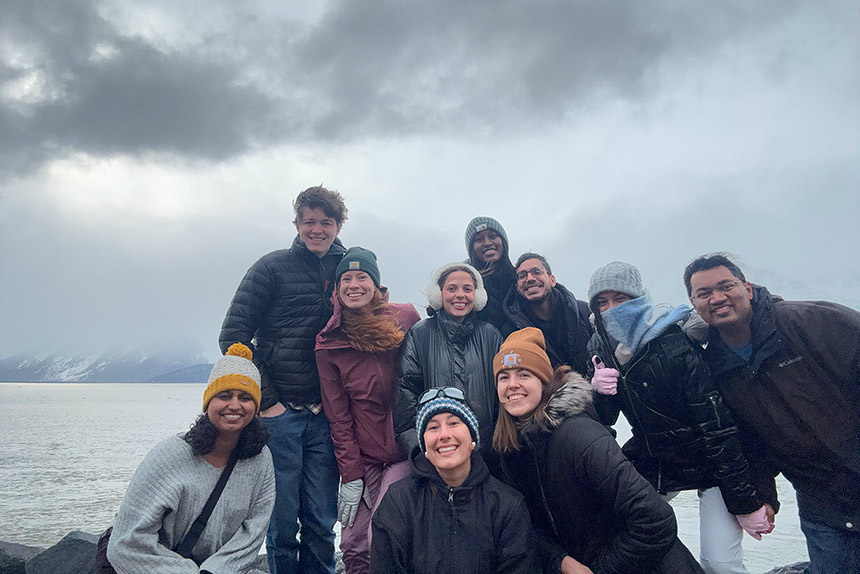
By Gwyneth K. Shaw
Each year, teams of Berkeley Law students skip a spring break vacation and instead devote themselves to a week-long, hands-on project at locations across the country. Students who do these Berkeley Law Alternative Service Trips (BLAST) say it’s an intense but invigorating experience, intellectually and personally — and this year’s leaders are no exception.
“Students at Berkeley Law have the freedom to spend their spring break however they want. I think there is something truly special about the students who choose to spend that hard-earned (and much needed) break devoting a week of their lives to pro bono work,” says Anya Mansoor ’25, co-leader of the group that traveled to Atlanta.
“We as leaders were incredibly impressed with our cohort of BLAST Atlanta students, who demonstrated at every turn their warmth, thoughtfulness, eagerness to learn, and commitment to uplifting their community,” she adds. “Plus, as we learned from our nightly family dinners, they’re very talented home chefs.”
BLAST is part of the law school’s Pro Bono Program, which also includes 40 Student-Initiated Legal Services Projects, and Call for Necessary Engagement in Community & Timely Response, which pairs students with community partners to help meet urgent needs. Students log thousands of collective pro bono work hours each year, and repeatedly call the program integral to their student experience.
BLAST trips are funded by the Pro Bono Program to ensure accessibility to all students. Each group is co-led by students, typically a pair but occasionally a trio, who build and maintain relationships with the supervising attorneys they work with as well as handle travel logistics and help foster the relationship between students.
Each group works with one or more local legal organizations, which partner with the law school and provide legal supervision and guidance for the students. It’s also an opportunity for students to get to know one another and their chosen area better — and, outside of their full-time work week, to have some fun together cooking, sightseeing, and building community.
“BLAST is a Pro Bono Program service learning experience that allows our students to take a short, but deep dive serving clients in various communities outside of the Bay Area. Each BLAST trip was originally founded by students with an authentic connection to the host community,” Pro Bono Program Director Deborah Schlosberg says. “The BLAST Program doesn’t take this invitation into the host community lightly and therefore asks for a deep level of commitment from trip participants. This starts in the fall with monthly meetings, readings, and trainings and builds to the full week of work over spring break.
“I feel a true sense of pride in the way our students approach their work through BLAST. This year, our supervising attorneys — all leaders in their field and communities — shared how fantastically kind, respectful, grateful, passionate, intelligent, and impactful our students were. I wholeheartedly agree.”
Here are the details of what each group worked on this spring.
Alaska
Partner organizations
First Alaskans Institute and Alaska Public Interest Research Group (AKPIRG)
Co-leaders
Mackenzie Gettel ’25 and Gaurav Lalsinghani ’25
This trip is designed to help offer critical legal services to underserved and overburdened communities in Alaska, as well as to build relationships between Berkeley Law and community organizations for the future and expose students to much-needed work in locations and communities they would otherwise not have access to. (This year, there was also a moose sighting.)
Gettel’s group partnered with First Alaskans Institute, an Alaska Native advocacy organization, and Lalsinghani’s team volunteered with AKPIRG to research clean energy and consumer issues. Students also learned from several judges and clerks in Anchorage and connected with local alums at a dinner event.
“Our trip to Anchorage was powerful. It illuminated the distinctive legal and economic challenges faced by Alaskans, particularly those in remote areas,” Lalsinghani says. “Working with local activists and legal experts at AKPIRG exposed us to the various tensions and perspectives that surround environmental concerns in the state. Compiling detailed legal research memos on a variety of current legislative issues brought the theoretical aspects of our studies into sharp, practical focus.”
Gettel says her favorite outing was to the Anchorage Museum, because of its beautiful art and personal touch. The nonprofits the group worked with were amazing, she adds.
“I had a great experience exploring Alaska with other law students passionate about pro bono,” she says.
Atlanta
Partner organizations
Kids in Need of Defense (KIND) and Atlanta Volunteer Lawyers Foundation (AVLF)
Co-leaders
Mansoor and Lorena Ortega-Guerrero ’25
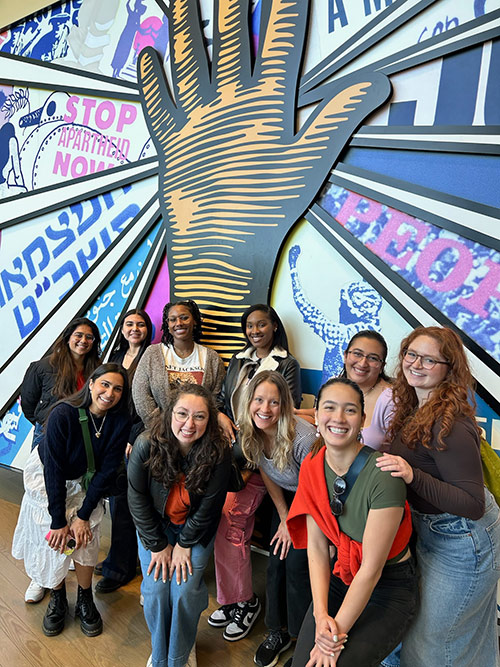
The “BLASTlanta” group worked with AVLF’s Safe & Stable Families Project, which serves families affected by domestic violence, and KIND, which offers legal representation to unaccompanied immigrant children. Ahead of the trip, students in this group spent time grappling with the intersecting factors that influence domestic violence and forced migration, and the legal needs of clients impacted by these experiences.
“Both teams worked directly with individuals who were advocating for themselves in the Georgia legal system, be it in seeking immigration relief or a temporary restraining order. Students conducted interviews, legal research, oral advocacy, and drafted briefs,” Ortega-Guerrero says. “Students demonstrated incredible advocacy skills, approaching their work with deep compassion and care.”
Under the guidance of KIND and AVLF, students helped to ensure clients felt supported and empowered, she adds. In their off hours, they learned from one another, sharing their unique professional and personal experiences that shaped their conversations and work.
“In law school, it is easy to forget your ‘why’ — the issues or goals that brought you to law school,” Ortega-Guerrero says. “That week, in community, we were all reminded of that as we learned from the attorneys and our clients the role that legal advocacy plays in shaping people’s lives, hopefully for the better. It was an honor to play a small part in this work with such a wonderful group of advocates.”
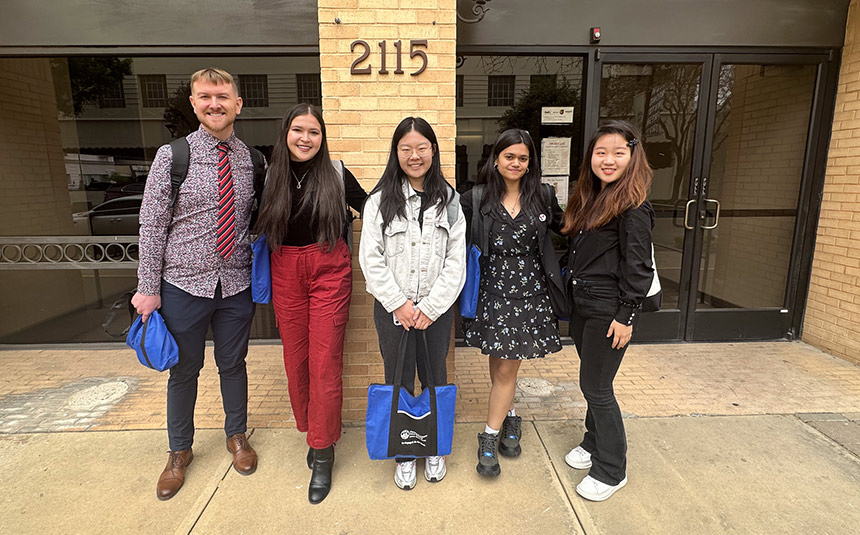
California’s Central Valley
Partner organizations
Central California Legal Services and California Rural Legal Assistance
Co-leaders
Jordan Hefcart ’24 and Steven Hensley ’25
Designed to open students’ eyes to the possibilities and need for lawyers beyond big cities, this region of California is an annual BLAST destination.
“I volunteered to co-lead the BLAST Trip to the California Central Valley because I wanted to highlight the unique legal challenges this area faces. Having experienced these issues firsthand, I’m passionate about educating others,” Hensley says. “This trip offers a valuable opportunity for students from diverse backgrounds to come together, gain a deeper understanding of the region’s specific legal challenges, and explore ways we can collectively improve conditions for everyone involved.”
The trip introduced students to the unique legal issues of rural poverty in California and aimed to have them be thoughtful, supportive partners with community members already working in the area. Students learned about the region’s importance to the state’s history, economy, and environmental and immigration trends, as well as the dearth of lawyers in the area.
“Leading the Central Valley BLAST was an enormous privilege. We had the opportunity to learn from work alongside truly remarkable people, including some who stood next to Cesar Chavez and Dolores Huerta on the United Farm Workers picket lines,” Hefcart says. “We were able to contribute to important and urgent legal matters concerning immigration, housing, and workers’ rights. I couldn’t have imagined a more meaningful way to spend spring break.”
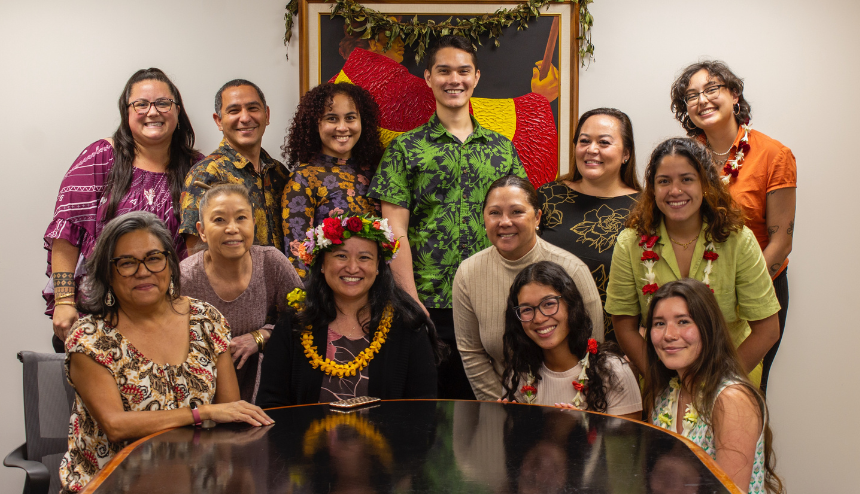
Hawai‘i
Partner organizations
Legal Aid Society of Hawaii and Native Hawaiian Legal Corporation (NHLC)
Co-leaders
Mel Tapia Cortez ’25 and Jamie Floyd ’25
The mission of this trip is to help students learn about systemic issues affecting Native Hawaiians as a result of the United States’ colonial history while supporting legal organizations that serve local communities and prioritize Native Hawaiian Sovereignty.
Working under the supervision of the two partner organizations, students took a multidisciplinary approach to community work in the uniquely diverse Hawai‘ian Islands. At Legal Aid, they supported community needs through legal research and direct client services. At NHLC, students tackled a variety of cases affecting Native Hawai‘ian cultural and land rights.
“From having the honor of working with the Native Hawaiian Legal Corporation for the past two years, I am immensely grateful to the staff for being a source of empowerment for Pacific Islander law students (and Indigenous law students more broadly) who are working to reclaim our lands and protect our cultures,” Floyd says.
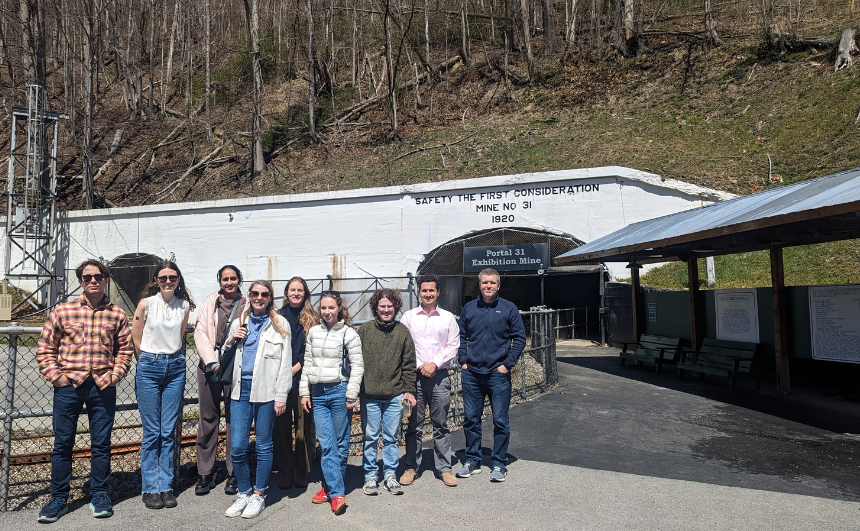
Kentucky
Partner organizations
Appalachian Citizens’ Law Center (ACLC) and Appalachian Research and Defense Fund of Kentucky (AppalReD Legal Aid)
Co-leaders
Ben Wise ’25 and Greg Margida ’24
This group also split into two teams, each working with one partner organization. ACLC works on environmental, public health, and worker’s rights issues facing eastern Kentucky, particularly related to the region’s mining history. The group represents coal miners and their families in black lung claims, protects clean water through legal actions, and collaborates with local activists to promote mine safety legislation.
AppalReD is a private, nonprofit law firm offering free civil legal help to low-income people in eastern and south-central Kentucky. The group’s attorneys, paralegals, and legal secretaries — in six local law offices — help clients get and keep basic needs, including adequate food and health care; decent, safe, sanitary housing; and personal safety and protection from violence and abuse.
BLAST Kentucky was designed to respond to the history of economic, environmental, and political injustice in Central Appalachia and the lack of experience many students in California have with the region. The experience was a powerful one.
“Kentucky BLAST got to learn from some incredible public interest lawyers who shared their commitment to and passion for their community in Appalachia,” Margida says.
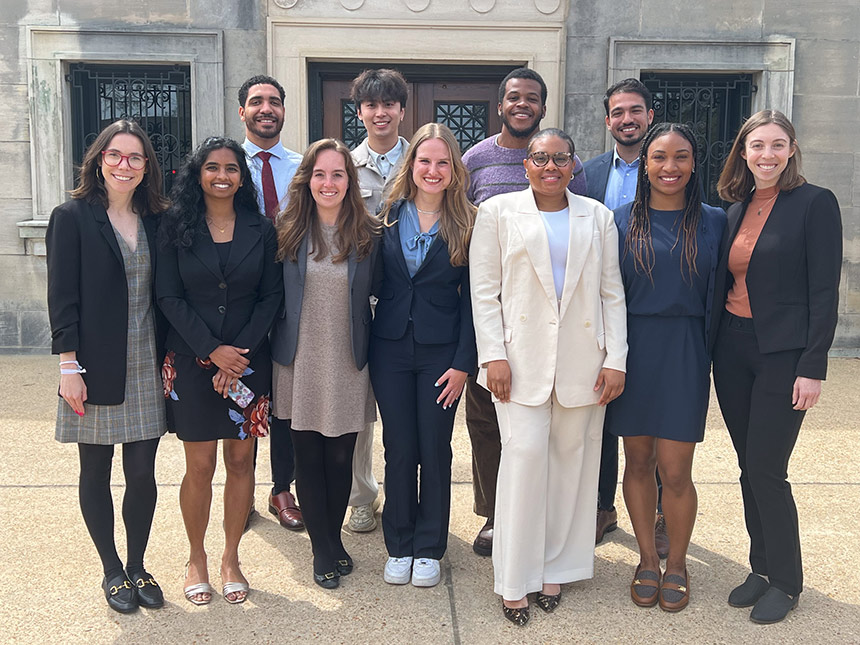
Mississippi
Partner organization
MacArthur Justice Center at the University of Mississippi School of Law
Co-leaders
Leia Walker ’25, Niki Kates ’25, Liz Mooring ’25
This year’s BLAST Mississippi trip focused on a policy project to identify reforms to the state’s prison reentry system. After starting off with a weekend in Memphis exploring the Civil Rights Museum, the group spent the week in Oxford and Jackson, conducting legal and policy research about parole, reentry, and transitional housing.
They also interviewed over 20 different stakeholders, including elected officials in the state Legislature, state parole board members, incarcerated women, transitional housing providers, prison administrators, policymakers, the state public defender, and local nonprofits that work in reentry, housing, and workforce development.
Finally, the students consolidated their findings into a memo to be circulated among stakeholders in Mississippi.
“Though it was a busy week, we also made time to explore Beale Street in Memphis, see a live blues show in Clarksdale, eat lots of top-notch Southern cooking, and hang out with some pigs at their supervising attorney’s farm,” Walker, Kates, and Mooring say. “One of the best things about BLAST Mississippi is that students get the opportunity to explore interdisciplinary work in a movement-lawyering context.
“By switching back and forth between legal research, policy research, interviewing, and politics, students got to practice a variety of skills in a creative, dynamic environment.”
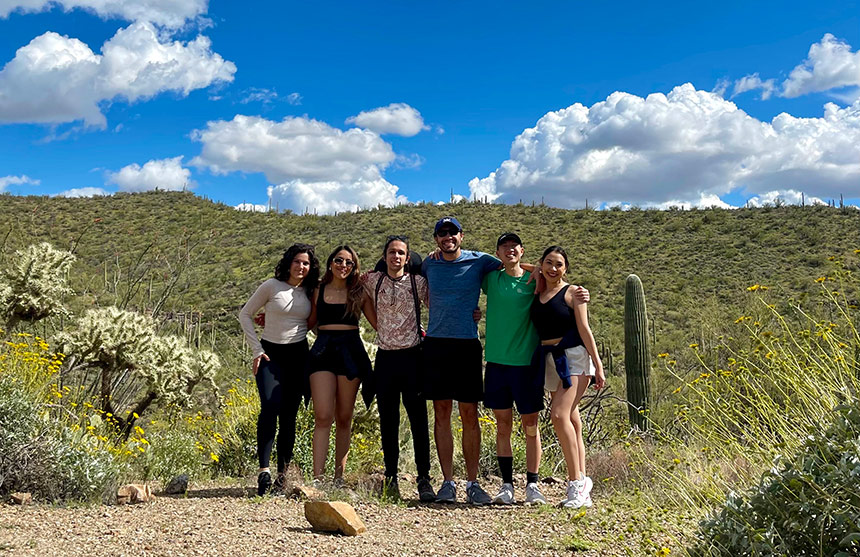
U.S.-Mexico Border
Partner organization
Florence Immigrant & Refugee Rights Project
Co-leaders
Eric Ho ’24 and Angélica César ’25
Based in Tucson, Arizona, this group of students traveled to help provide legal services to and learn from immigrant communities residing around the border in partnership with the Florence Immigrant & Refugee Rights Project, which offers free legal and social services to detained adults and children under threat of deportation.
Students got a firsthand look at the obstacles facing the thousands of people detained by the U.S. Department of Homeland Security in Arizona — many of whom are seeking protection from violence and persecution in their home countries. With language barriers, limited understanding of U.S. law and court procedures, and sparse financial resources, they face an uphill battle to win immigration relief.
“The Florence Project was an excellent partner organization and planned a week that really required us to grapple with the on-the-ground realities of our incredibly broken immigration system at the border,” Ho says. “The week was emotionally challenging in many respects, but I was honored to see each of our team members engaged in asking difficult questions, both of our supervising attorneys and of themselves.”
Ho plans to represent immigrants after he graduates and says he’s grateful for the opportunity to see the many challenges immigrant communities go through at the border. His BLAST experience will help ground his work with a more holistic and human perspective, he adds.
César grew up in Arizona, and says her experiences living in a border state as part of a mixed-immigration status family informed her decision to pursue a J.D. She came to Berkeley Law to join a community that’s actively invested in promoting the human rights of migrants, she says — and co-leading this BLAST trip was a prime chance to do just that.
“As a daughter and sister of formerly undocumented women of color, my connection to immigration advocacy is deeply personal and close to my heart,” she says. “It was a beautiful honor to share a piece of my home state with my peers and to get to observe the critical work of the Florence Project, the Kino Border Initiative, and other partners.
“I know that we are all walking away from this experience with a deeper understanding of the human cost of our nation’s abhorrent immigration enforcement practices. Each and everyone of our BLASTees leads with compassion and kindness, and I can’t wait to continue to partner with them in the future.”